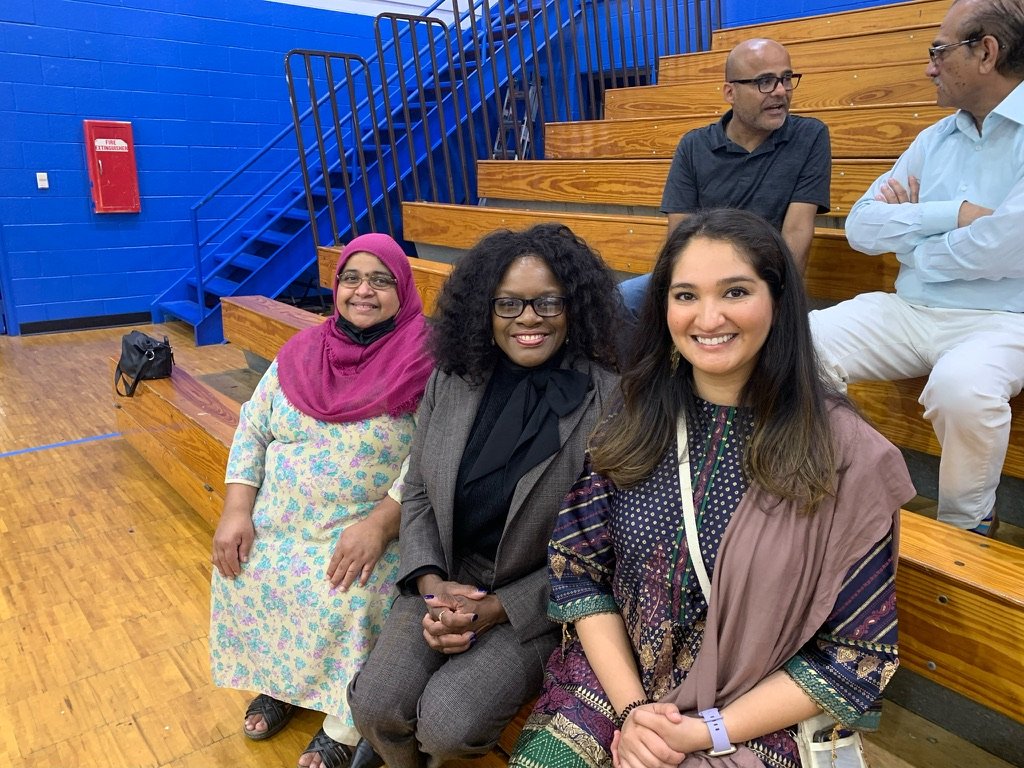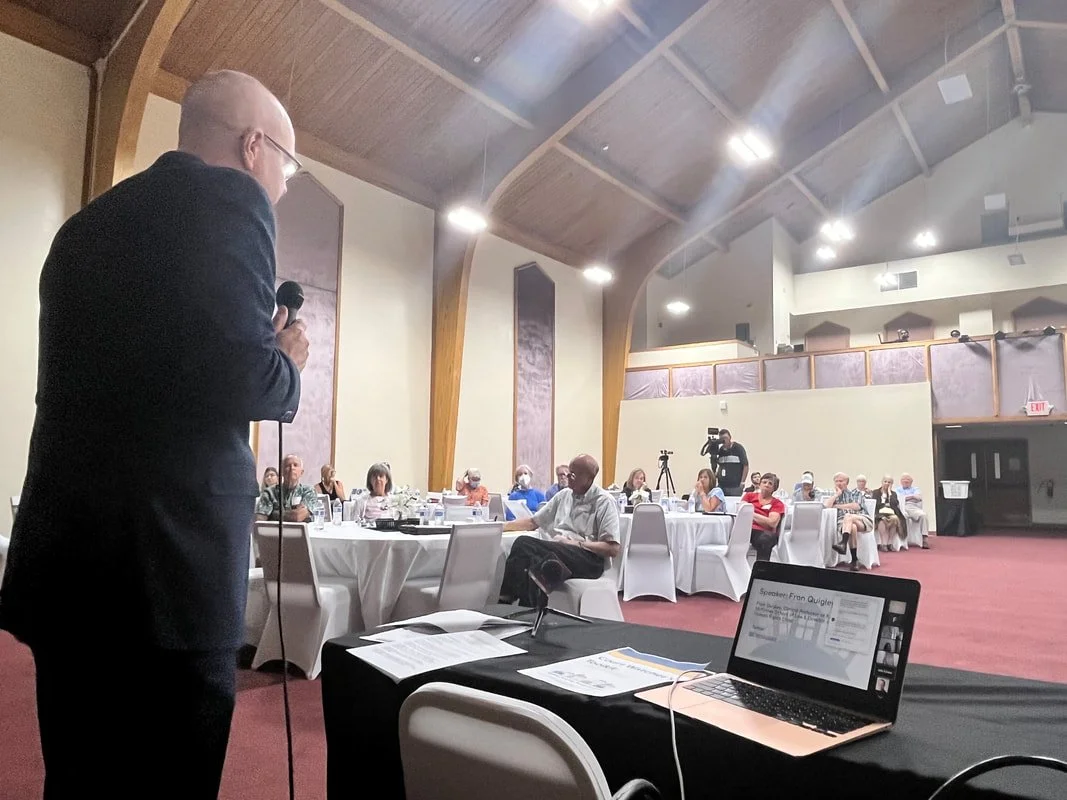-

Indiana Muslim Advocacy Network is proud to serve as the liaison between the Indiana Muslim community and elected officials and public policy leaders.
-

Each election cycle, the Indiana Muslim Advocacy Network plans to identify competitive races, hold voter registration drives, publish voters education guides or lead Get Out the Vote campaigns.
-

Community engagement is a two-way process that ensures the organization and the Indiana Muslim community are equally informed and engaged.
Issues
-
What is Free Speech?
Free speech is one of the cornerstones of our democracy inscribed as our First Amendment right.
Our Advocacy Efforts:
One of our core beliefs is the protection of the First Amendment. Students, faculty and administrators should have the ability to advocate for issues that are important to them. College campuses are meant to be a safe place for continued education and civil discourse. During the 2024 legislative session, we were able to work with elected officials on both sides of the aisle to ensure our first amendment rights were protected. We will always advocate for these continued rights of our Hoosier students.
-
What is anti-sharia law?
A ban on sharia law is legislation that prohibits the implementation of Islamic law in courts in any civil jurisdiction.
Our Advocacy Efforts:
While no such legislation was introduced this legislative session, based on prior experience, it is possible that such a bill will be introduced again in the future. Indiana Muslim Advocacy Network opposes any proposed Anti Sharia legislation because:
(1) Such a legislation attempts to address a non-existent problem;
(2) It will be used as a premise to promote anti Muslim propaganda;
(3) It will provide a potential forum for hate speech against the Indiana Muslim community;
(4) Such a legislation has the potential for creating a lot of bad press for the State of Indiana.
-
What is Bias Crimes Legislation?
It is a legislation that would allow the judge to aggregate the sentence if a criminal offence was committed against a person, property, group of people motivated, in whole or part, by the offender’s bias against a religion, race, disability, gender, sexual orientation, or national origin.
Our Advocacy Efforts:
Prior to the 2019 legislative session, Indiana Muslim Advocacy Network joined Indiana Forward, a bipartisan advocacy group, whose members include major state employers, faith groups, nonprofits, the Indy Chamber, trade groups and universities. Indiana Forward supported Governor Holcomb’s call for “inclusive” hate crimes legislation. Such legislation would allow judges to increase criminal sentences when the crime was motivated by bias toward a victim’s characteristics that include race, ethnicity, religion, national origin, sex, disability, gender identity, and sexual orientation.
In January 2019, State lawmakers filed 11 bills that would allow judges to impose tougher sentences for bias-motivated crimes, including Senate Bill 12, which met the inclusive standard sought by Indiana Forward and Gov. Holcomb. All of the Senate bills were assigned to the Rules Committee, where President Pro Tem Rod Bray could control their fate. The committee approved the bill on a 9-1 vote after more than 3 hours of testimony. Sen. Phil Boots (R-Crawfordsville) was the sole “no” vote. SB 12 would have allowed judges to impose longer sentences for crimes motivated by bias toward a victim’s characteristics, including race, ethnicity, religion, national origin, sex, disability, gender identity, and sexual orientation.
The day after SB 12 passed committee with the inclusive provisions sought by advocates, Sen. Aaron Freeman (R-Indianapolis) offered a floor amendment that stripped the list of characteristics from the bill and replaced it with language that simply allowed a court to consider “bias” in deciding whether to lengthen a criminal sentence. The amendment was approved 33-16. On February 21, SB 12 was approved by the full Senate on a 39-10 vote. Sen. Ron Alting was the sole Republican to cast a “no” vote.
Senate Bill 12 moved to the House of Representatives and was assigned to the House Courts & Criminal Code Committee, where it did not receive a hearing. In late March, Rep. Greg Steuerwald amended unrelated legislation (Senate Bill 198) with language that allows a judge to increase a criminal sentence if “the person committed the offense with bias due to the victim's or the group's real or perceived characteristic, trait, belief, practice, association, or other attribute the court chooses to consider, including but not limited to an attribute described in IC 10-13-3-1.” (IC 10-13-3-1 is the state’s existing bias crime reporting law. Attributes listed are color, creed, disability, national origin, race, religion, and sexual orientation.)
SB 198 passed the House 57-39. The Senate subsequently concurred with the changes on a 34-14 vote. Because the hate crime language was added to SB 198 in a floor amendment, there was no opportunity for testimony from the public. On April 3, 2019: Gov. Eric Holcomb signs watered-down hate crimes bill.
-
What is anti-bullying legislation?
It is a legislation that helps reduce and eliminate bullying in schools.
Our Advocacy Efforts:
Due to the fact that Muslim community members have approached Indiana Muslim Advocacy Network with different cases of school bullying, where their children have been harassed because of their race, religion or color, the organization advocated for the passage of House Bill 1356. This bill would strengthen the reporting requirements, which would help policymakers and educators identify the scope of bullying in Indiana schools and address it accordingly.
On Monday, January 29, 2018, Hazem Bata testified on behalf of IMAN Associates at a House Education Committee hearing on House Bill 1356. Mr. Bata spoke to the need for accurate data on bullying, and told committee members about an incident that his own U.S.-born son experienced when several middle school classmates urged him to “go back to India.” HB 1356 had successfully passed the Senate and House floors and was signed into a law.
The organization seeks to take a more informed position through determining the scope of the issue in the Muslim community and how resources can be tailored to the needs of the students and school staff members to diminish such an issue.
-
What is redistricting?
Redistricting is the process of drawing state and house district boundaries. Currently, the Indiana General Assembly draws those boundaries. Some believe that current maps suppress voter rights since they allow elected officials to choose their voters, rather than voters choosing public officials to represent them.
Our Advocacy Efforts:
With Indiana’s state House districts being the 5th most gerrymandered in the country, IMAN Associates acknowledges that partisan redistricting puts political considerations ahead of community interests and thwarts our democracy. With that being said, the organization joined the Indiana Coalition for Independent Redistricting, a coalition to advocate for redistricting reform. All organizations involved agreed that an independent, nonpartisan commission, powered by the people for the people, is the only way to draw fair maps and end gerrymandering in Indiana. Despite the efforts to pass such a legislation, the super majority pushed back and blocked all the proposed bills. The 2020 legislative session was our last chance to bring redistricting reform to our Hoosier state before the 2021 census.
Given its commitment to drawing fair maps, the coalition decided to organize the Indiana Citizens Redistricting Commission (ICRC), a diverse and representative group of nine Hoosiers who will lead a public discussion about what criteria should direct redistricting in Indiana and identify important communities of interest throughout the state.
This information will be compiled and delivered to legislators with the request that they follow its recommendations as they embark on their map-drawing efforts.
ICRC members will also serve as judges for our public mapping competition which will invite Hoosiers to get directly involved in redistricting by drawing Congressional and state legislative maps themselves using open source software and public data. To learn more about the commission and the application to join, visit: allinfordemocracy.org.
-
Affordable housing crisis and eviction epidemic have been wreaking havoc in our Hoosier state for a while. In 2016, Fort Wayne, Indianapolis and South Bend ranked 13, 14 and 18 respectively among cities with the highest eviction rates, according to the Evictions Lab report. In those three cities, about 7 in 100 renter homes are evicted every year.
In contrary to popular belief that eviction is a condition of poverty, studies show that evictions lead to financial strains and may cause poverty. Housing stability is imperative for communities to thrive. When individuals and families are forcibly expelled from their homes, they become vulnerable to losing their jobs, dropping out of school, experiencing poor health and developing mental health problems. They lose that sense of community that they once had, which negatively impacts neighborhoods’ quality and the community at large.
While we attempt to understand the scope of this crisis, we want to take a closer look at public policy in Indiana and identify policies that can be instrumental in reducing the number of evictions across the state. We also amplify the crucial work of community organizations in the housing space, including the Fair Housing Center of Central Indiana, Prosperity Indiana, and the Hoosier Housing Needs Coalition. And because faith communities exist to uplift the entire community, IMAN Associates joined hands with multi-faith leaders who came together to form the Greater Indianapolis Multi-faith Alliance (GIMA), which addresses affordable housing, homelessness and evictions. We will continue to raise awareness, advocate and mobilize the community to action.
The COVID-19 pandemic has exacerbated this crisis. More Hoosiers are facing evictions and its devastating and long-lasting consequences. Our Hoosier state is confronted with widening health, economic and educational disparities and the time to act is NOW!
